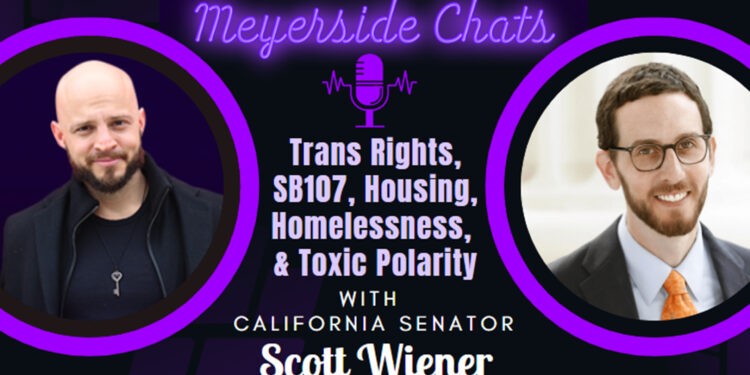Evan Meyer welcomes California State Senator Scott Wiener on this episode of Meyerside Chats.
Recorded October 7, 2022
Elected in November 2016 and reelected in 2020, Senator Scott Wiener represents District 11 in the California State Senate. District 11 includes all of San Francisco, Broadmoor, Colma, and Daly City, as well as portions of South San Francisco.
Summary:
State of politics, extreme polarization, fed vs state difference | 1:00
Clarity on the SB107, and minor gender | 5:00
California vs other states age for minor decision-making | 7:00
Legalize, legislature, complexity vs simplicity. | 12:00
Why there is opposition against many of the trans-friendly bills | 15:00
democrats vs republican political strategies | 20:00
Homelessness and the prioritization of approaches. | 25:00
Meyerside Chats seeks to eliminate the "us and them" narrative and toxic polarization by striving to create virtuous community leadership, and authentic conversation. The intent is to showcase the humanity in those that take on the often thankless jobs of public service through civil discourse, and honoring differing points of view.
Interested in any of the civic topics above? Please make sure to subscribe to the Youtube channel. You can also tune in to Meyerside Chats on the Santa Monica Daily Press.
In the Senate, Senator Wiener works to make housing more abundant and affordable, invest in our transportation systems, increase access to healthcare, meaningfully address climate change and the impacts of wildfires, reform our criminal justice system, reduce gun violence, reduce California’s high poverty rate, and safeguard and expand the rights of all communities, including immigrants and the LGBTQ community.
Senator Wiener has authored 65 bills that have been signed into law. Among them are SB 35, a landmark law to expedite housing permits, which has resulted in thousands of new affordable homes in San Francisco; SB 10, which provides a powerful tool for local governments to zone for more housing more quickly; SB 886, which streamlines and accelerates student housing production across the state; SB 855, which makes California the national leader in mental health and addiction treatment access by requiring insurance companies to cover all medically necessary treatment; SB 822, which enacts the strongest net neutrality protections in the nation; SB 1045 and SB 40, which expand and strengthen California’s conservatorship laws to help individuals who are living on our streets with severe mental health and substance use disorders; SB 379, which requires cities to implement instant permitting for solar and energy storage systems; SB 700, the largest investment in clean energy storage in California history; SB 923, which modernizes California’s eyewitness identification standards to ensure innocent people are not sent to prison; SB 136, which reduces mass incarceration by repealing California’s most commonly used sentence enhancement; SB 73, which ends mandatory minimum sentences for nonviolent drug offenses; SB 107, which provides refuge for trans kids and their families in California so they can avoid criminal prosecution for seeking or allowing gender-affirming care in states like Texas and Alabama; SB 219, which protects LGBTQ seniors in long-term care facilities; SB 159, which allows pharmacists to provide PrEP and PEP (powerful HIV prevention medications) without a physician’s prescription; and SB 132, which requires prisons to house transgender incarcerated individuals according to where they’re safest (for example, by gender identity).









